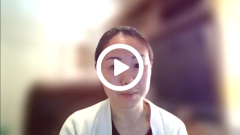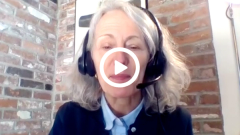
Clinical Insights for Treating RAI-Refractory DTC
Lori J. Wirth, MD, offers advice to oncologists using lenvatinib when treating patients with differentiated thyroid cancer.
Episodes in this series

Lori J. Wirth, MD, associate professor of medicine at Harvard Medical School and medical director of the Center for Head and Neck Cancers at Massachusetts General Hospital, offers advice to oncologists using lenvatinib (Lenvima) when treating patients with differentiated thyroid cancer.
Transcription:
0:09 | One piece of advice that I would have for oncologists seeing patients with differentiated thyroid cancer is that this is an uncommon disease. In general, we do not see a lot of patients with differentiated thyroid cancer in our oncology clinics. When patients do not have a large burden of disease and when they are asymptomatic, there is time to learn a little bit more about the disease, and also the particular patient's version of the disease because some differentiated thyroid cancers progressed very slowly over time, others progress more rapidly over time, and getting a handle for exactly what the rate of progression is before initiating therapy can be very helpful to understand.
1:11 | Another thing that I would say is that it is important to confirm that patients have iodine-refractory disease. There are patients who have metastatic thyroid cancer who might actually benefit from and respond to radioactive iodine, and we want to make sure that radioactive iodine is offered to patients who might have some benefit from that therapy. Our endocrinology colleagues who tend to follow these patients and refer them to us in medical oncology are always happy to discuss their patients and help the medical oncologist who may not know the patient quite as well understand a little bit better what that particular patient's version of thyroid cancer might be.
1:59 | The other thing that I would say in terms of a tip is that it is important to make sure that patients are in good shape prior to initiating lenvatinib. Patients do need to have good blood pressure control before initiating lenvatinib. The hypertension can be seen early in the course of starting therapy. Patients need to be monitoring their blood pressure, need to know when to call for hypertension, blood pressure management needs to be initiated right away. You don't want to wait a couple of weeks after seeing hypertension before starting drug therapy for hypertension in patients.
2:45 | We actually analyzed the pharmacodynamics of treatment-emergent hypertension in patients on the SELECT trial [NCT01321554], and did see that there was a progression-free survival benefit, but also an overall survival benefit in the patients who developed treatment-emergent hypertension on lenvatinib in SELECT. One thing that you do not want to do is stop lenvatinib as soon as patients develop hypertension. You want to optimally manage the hypertension and keep them on lenvatinib because that predicts a strong benefit from the therapy in those patients. The other thing is that I think can be helpful is to make sure that you are taking advantage of your dietitian colleagues to help patients manage the diarrhea and anorexia and mild nausea that can be seen because it can be difficult for patients to maintain a healthy nutritional balance and maintain their weight while on lenvatinib and dealing with that tricky combination of diarrhea, anorexia, and a little bit of nausea.






















